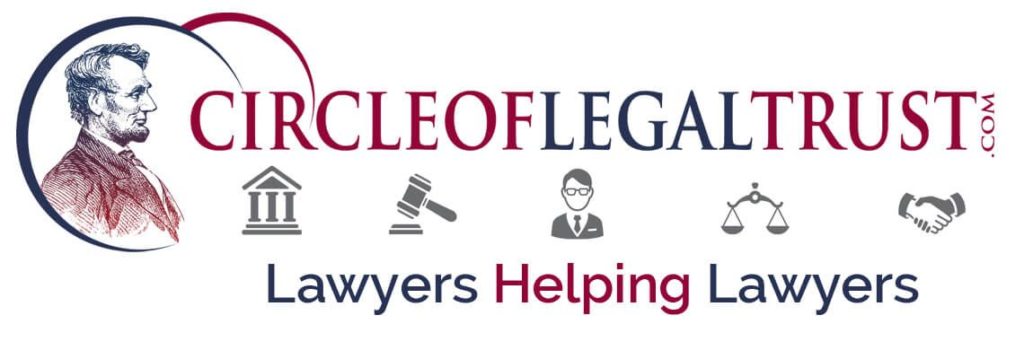Google’s Link Spam Update Over- Injury Law Winners & Losers Post 2022
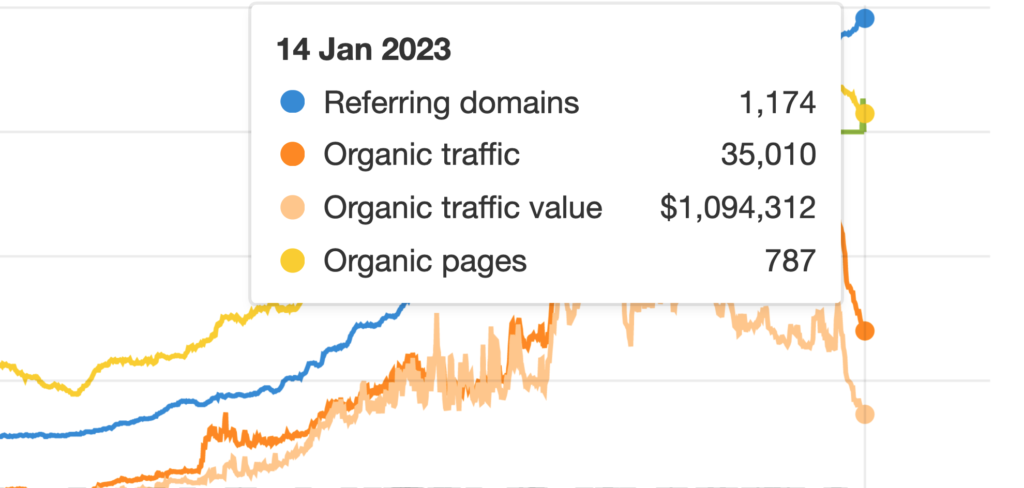
Welcome to Circle of Legal Trust, and also with my first effort in years at making a post outside my tendency to stay away from social media and people in general. I am Hans Mueller. I don’t have an extensive social media profile, and I now live primarily in Slovakia.
My Expertise, Experience, Authority, and Trust as a Googler
My www. expertise is in advanced search engine optimization and backend engineering. I heavily research Google patents and have consistently followed Bill Slawski for years to understand Hummingbird and its subsequent add-ons, integrating AI into writing and reading mainly based on semantics. Spam Brain, like Rank Brain, will radically change lawyer SEO, as will be discussed.
Evolution of Lawyer Search Results
I have worked on significant law websites discreetly for over 30 years. I don’t want more clients, so please don’t ask. I have seen the evolution of meta keyword spamming, buying expired domains for the link juice, and the evisceration of once-major search engines like Excite clogging their home pages with sponsored ads.
I have been monitoring Big Law sites and trying to see how Google would balance its need for ad revenues with users’ desires for high-quality search engine results. For years I wanted to share what I learned. After what happened over the last two weeks, I think it’s a good time, as this previous update was a significant game changer, and I am leaving the field to retire permanently. I want you all to know more than anything: “Google is no longer a stupid algorithm.”
Concerning these two new, MAJOR, life-altering spam updates, which seem to have hit Big Law sites buying links or using guest posts posted on generic, non-targeted domains, that remind me of domain farms of 2012.
This will probably be my first and last post at Circle of Legal Trust, as I honestly don’t have the time. However, After reading COLT’s updated article featuring Bill Slawski about Google’s rank-modifying spam filter, I wanted to show everyone what I think is happening with organic and local searches and offer my thoughts.
Recent Spam Updates to Google Search
Google recently took additional steps to ensure higher-quality organic results after a new generation of AI, and a massive influx in GUEST POSTING on generic websites, both paid and for trade.
Old SERPs New SERPs
The front page of Google is filled with more and more paid ads. What was once the number SERP one in organic is likely more like what the number 6 or 7 result used to be. The effects of this latest shake-up are devastating for Big Law and guest posters, as will be discussed by me later.
Using Ahrefs and a few other diagnostic tools, I will look at the Barnes Firm, which evolved originally from Celino and Barnes’s fame from New York. I will use this Ahrefs tool and other public knowledge I have obtained to analyze what happened and some theoretical reasons why.
DISCLAIMER: To be clear, I am not accusing anyone I am reviewing of spamming, as Google seems to move the goalposts so much that many are not sure what spam is until the latest definition is rolled out. In-house SEO people are usually the reason Big Law sites fail. My experience is they are more like professional blame placers and credit takers being paid too much for doing too little. After all, they have your ear, and you are in court.
I am using Barnes as an example because, based on the diagnostic tools, it is clear that Barnes fell like Lucifer from heaven almost immediately after the Link Spam and Helpful Content updates began to run, as I will show you in screenshots.
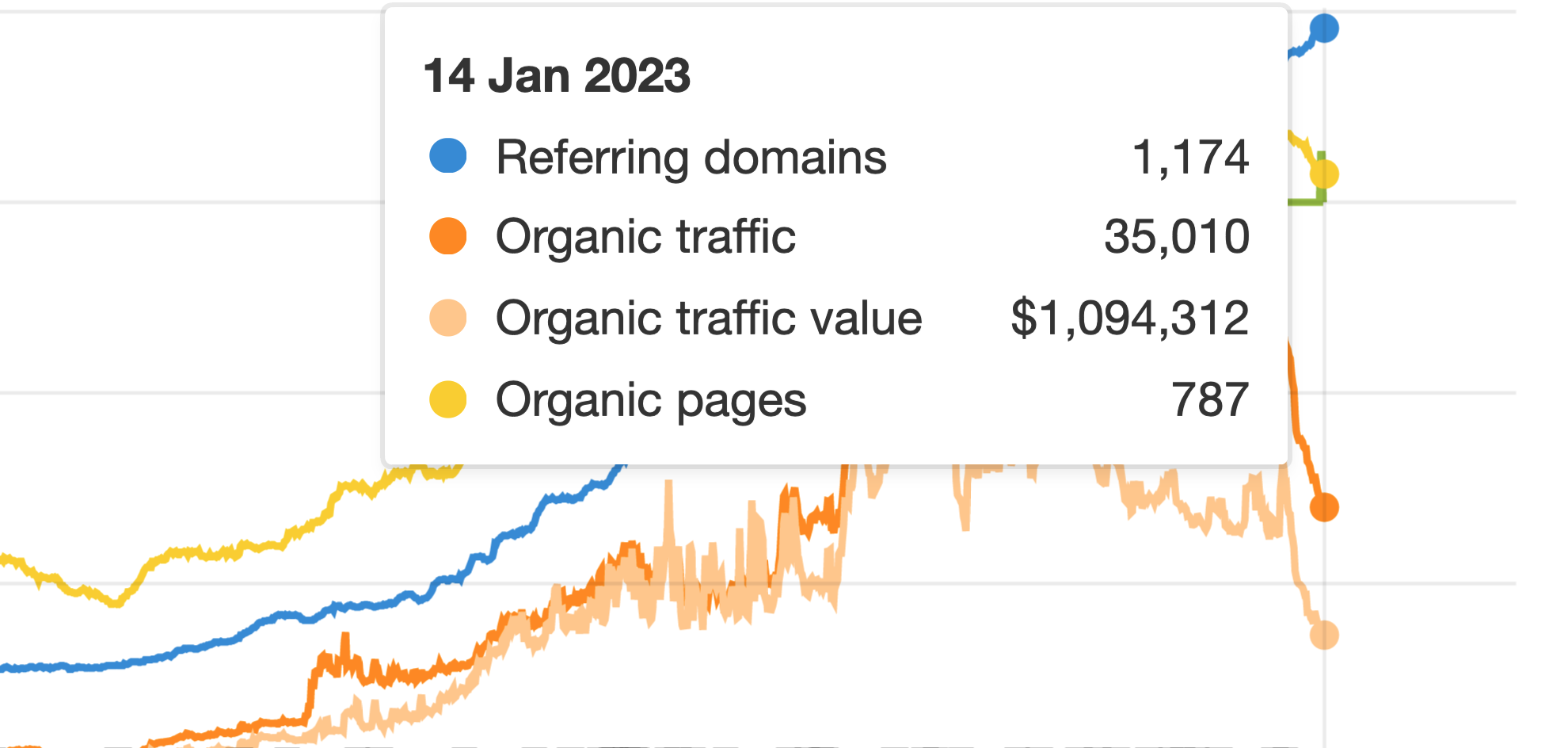
And I won’t rule out infighting between web admins after the original New York firm dissolved, with both sides firing Google spam reporting tools back and forth. Sadly, it was a very bitter and public breakup that tarnished both sides. But either way, the loss in the ranking was directly associated with the two recent rollouts.
Helpful Content Update Musings
Concerning the Helpful Content Update of December 2022-2023, interestingly- and worryingly- some Big Law lawyers were exposed for ignoring Google’s spam policies and stuffing their online pages with thin content and other questionable techniques in an attempt to boost their site’s ranking, such as using AI content creation tools to crank out lots of pages and clog up Google’s servers.
Again, I have no clue what the sample website did or did not do. I am just using this example, as it is directly related, and I can use Ahrefs to show all the generic guest post blogs they received links from that do, in fact, sell guest posts.
Key Factors and SERPs
Search results worldwide are based on critical factors, but some site owners try to achieve high rankings by playing the systems. Everything from e-commerce stores to what legal teams are using tricks to generate orders is why the spam update exists in the first place. I am not going to getuch into this, as it ty self-explanatory. Like Panda 2012, it punishes copy primarily written to manipulate the rankings in SERPs.
Like Panda had a relationship with Penguin, so does the Google 2022-2023 Link Spam Update. If a site links to you with garbage copy, it certainly won’t help you. And enough of them, Google could block or greylist your site with a filter. Or Google could apply the rank-modifying spam filter and keep playing with your web admins for years!
Attack of the Killer Guest Posts
My takeaway is that most guest posts are garbage, as is most AI-generated copy used for the articles posted on the sending sites. I bet your site tanked if you relied on these tools to beat your competitors. I feel that lawyer sites try and copy each other and get the same links (guest posts, etc.) from the areas used by Big Law.
Lazy SEO Philosophy: You must copy these large out-of-town firms that moved into your city by copying what they did. It’s like a game of leapfrog.
But I think Google just bitch slapped sites buying guest posts and relying on AI-generated content regularly. Maybe you should start building authorship profiles on trustworthy law sites and develop your EEAT. Better yet, start doing videos and create a better social media experience. I think Google will eventually send all organic results to page two or worse. They are not a reliable medium anymore unless you are paying them, in my opinion.
The Google Link Spam Update Explained
Here is all you need to know about the change after a spam update, what went down with specific types of legal websites that blew up or down, and what you can do to create a solid, reliable, and trustworthy reputation in the online legal world where you appear in results.
What Is the Google Link Spam Update?
There are many types of spam. Each mentioned past rollout usually targets a different and exciting kind of spam. Google’s spam-related algorithm update targets companies that use their online sites inefficiently and dishonestly by including content that the search engine giant considers spam. Automated systems and web admins/spammers learn which websites use spam hacks to pull in visitors and readers and how to monetize the loophole signals before they get demoted again.
This update targeted, in unison with the Helpful Content Update, these practices that boosted many a legal website’s ranking and impacted many sports sites. The effect is to make spammers rank lower, encouraging them to create content that deals explicitly with their target audience in a meaningful way. Google announced both would fully roll out in December 2022, but Google added days later, its final ending was not till a few days ago in 2023.
TIP: At the outset, making changes like rewriting copy may help. But if you have a massive site like the Barnes Firm, you may want to decline further development and start over with a new site that complies or start disavowing guest post links en mass before beginning any other changes. This is the best way to benchmark test any changes one by one to resolve these theoretical questions.
What Is Its Purpose?
From time to time, Google does jarring and jolting updates like this after it has gathered a lot of data, including from human intervention, like its Manual Reviewer Program. Google started improving this surveillance after Hummingbird and then, more recently, Rank Brain. Google’s AI-based spam prevention system can now monitor and zap your rankings in real time. If you don’t buy this, keep reading.
I am sure there are many reasons Google does ranking shuffles besides trying to rake in more Pay Per Click money. The most damning ones often happen near the holiday season. This 2022 spam update was no different, and as usual, little information was provided other than the normal warnings, don’t spam again.
Protecting User Experience
The reason Google started rolling these spam updates is to avoid users clicking on the wrong links when they use a google search because if they do, people will stop using it and switch to other search engines. This is called a “terrible experience,” Manual Reviewers have guidelines to look for search spam like this and tag such websites, which a spam update should review.
What Does Google Say?
John Mueller of Google says the latest jolting updates are not a manual action. He says you don’t have to worry about negative SEO attacks or link spam links pointing to your money site unless you built them yourself. (Source.)
What Is the Correct Approach Here?
This tells me that you may want to reconsider using the link disavowal tool and start disavowing any links that were built on a computer that used a Google search or service. That’s all Google needs to take you out.
- Google is Like Santa Claus?
Google has its good and bad list, just like good ole little Saint Nick (Beach Boys). I would immediately disclaim any and all links you built to your site using a Google Gmail account, Google Docs, or another other Google product. I would go so far as to say even if you didn’t use a Google product but still used a computer you searched on Google with, Google likely knows exactly what you and your cheaply priced spam team in India or Pakistan did.
Google Employees Decide What Gets Punched into the Algorithm?
It appears so. Google can even send political emails it doesn’t want you to see to your spam. It tracks your IP and computer Mac address and even has the ability to know your keystrokes. Google wrote this down in black and white many times in the past, and Google spam updates are only getting smarter.
Google knows about your gender, age, and home and work addresses – not to mention your financial status, your health, and even your sexual tendencies. (Source.)
Google probably knows everything and can probably even hear, record, and store your own words from your mouth through your computer or Android, and even your Apple iPhone. We also know Google hires former intelligence officials and DOD employees and likely shares your information with U.S. law enforcement and intelligence officials.
Remember, Google aided Communist China in its social surveillance program. Canada’s Trudeau is already installing that same program to silence the opposition and cut off the bank accounts of anyone who disagrees with the government. Knowing this, it makes sense you never ever openly support ideas GooglePlex disagrees with if you wish to maintain happiness from the Google gods.
All To Uncover Manipulation?
Spam updates aim to uncover companies and website owners that manipulate their content in the hopes of boosting their Google search results. We know that Google filters scientific data provided by independent medical doctors (even when peer-reviewed) in favor of the UN’s central control of health info generated by the UN’s government-paid doctors. And this makes sense, as Google is trying to avoid more anti-trust lawsuits. Additionally, partisan politicians get to decide if Google gets sued or not, especially in Europe.
As the UN Said, “We own the science.”
We partnered with Google, for example. If you Google climate change, at the top of your search, you will get all kinds of UN resources. We started this partnership when we were shocked to see that when we’d Googled climate change, we were getting incredibly distorted information right at the top.
We are becoming much more proactive. We own the science and we think that the world should know it, and the platforms themselves also do. But again, it’s a huge, huge challenge that I think all sectors of society need to be very active. (Source.)
The only reason I am pointing this out is that Google has the capability to know what you are doing and how you do it. Google can even filter you if your fluid view of science as a theory disagrees with their view of science as “government-owned.” If you go against the grain, say or do the wrong thing, you can absolutely lose big, just like many Big Law sites lost big here.
Google Says “Value” Over Content
The recent link spam update essentially searches for online companies focusing more on content than the product they provide. The link spam update is the most effective tool for separating valuable websites from those packed full of time-wasting trickery- and highlights the ones that fail to follow Google’s search essentials for high-quality content. What this is, of course, is always very vague and ambiguous to the end user.
Shielding Users from Malware Attacks
In part, Google’s systems nullify spammy links to avoid exposure to phishing scams and reduce the risk of site visitors unknowingly installing malware on their devices. But this Google spam update was focused more on sites buying links and those with garbage on-page copy. In the Barnes example, their copy seems high quality to me.
Their UI and UX are great, at least according to Heat Maps, and in my overall opinion, their site complies with the Helpful Content update. Barnes seems to get hammered more during Core Updates over some other problem I cannot identify here. My guess is Google saw on new reports they are a New York firm or that they constantly try and set up mailing addresses in the same buildings as lawyers that ranked well in Google maps prior to them setting up mailboxes at the same locations, maybe? Heck, Google may think they are actually Morgan and Morgan, as they seem to use the same or similar SEO tactics.
How Long Does it Take?
Each update takes up to two weeks to complete as it scans the web for link spam, poor content, and dishonest uses of SEO tools. This one took much longer.
Fear and Doubt Just Like 2012?
We thought Google’s December 2022 link spam update was complete. But Barry Schwartz said otherwise, and it looks like it was finished rolling out a few days ago. Many Circle of Legal Trust contributing lawyers who lost law practices or went bankrupt over the 2012 era Panda and Penguin updates braced themselves for the helpful Content and Link Spam updates as seemingly [eerily] reminiscent.
In fact, COLT was created originally to help lawyers find solutions after their in-house SEO people, and link builders failed them; at least, that is what I was told by my buddy here, who is a top medical SEO person. That algorithm update targeted people buying exact match anchors and thin, poor copy/content. Matt Cutts, a former Department of Defense employee who acted as Google’s defacto SEO spokesperson, and others in the search engine community advised people it might be cheaper to trash their websites and start over.
- Link Disavow Tool
Ultimately, under pressure from SEOs and probably shareholders, Google created a link disavow tool so people could sort of report themselves and be forgiven for having bad links. This sparked off a period of negative SEOs, using the same spammy directories and programs like XRumer to link spam bomb their competitors, and it WORKED!
Shady SEOs kept making money, and webmasters complained Google gave them a weapon to destroy competitors who had clean sites. This created an environment of fear that pushed lawyers, in particular, into PPC ads, and every single lawyer I spoke with lost their shirts and received basically junk calls or what they claimed were fraudulent clicks.
Note: Negative SEO may still work, so if your website swiftly lost SERPs following the 2022-2023 spam updates, it might be intelligent to look into your site’s security [especially if it’s open source like WordPress] for indicators of a possible attack to grab personal information, or installing malware. Sites that see rapid loss or drop in the SERPs may be competitive industry targets in need of security improvement.
- Impossible to Consistently Rank in Maps
Ranking in the Maps with consistency was almost impossible, as the Mapsguide Program and other backdoors allowed competitors and their local SEO companies to constantly edit business names and user data against the wishes of the SMB. Many out-of-state Big Law firms started setting up PMBs and mail service in buildings where local attorneys were practicing with the hopes of siphoning off clients at these “City Center” locations, and it worked.
Google did try and stop this advantage by making only one similar business at the same address rank. But all that did was help the Big Law firms that have no presence at these locations. True local businesses are left with PPC or improving organic search results. Making changes may help, like relocating somewhere there are no other lawyers. Or just use PPC and hope you get a case that way?
For now, the inconsistency and uncertainty of Maps and Google My Business have devolved back into a chase for organic traffic, even though even getting a link with PageRank that passes a spam update is next to impossible. I personally know of many journalists who probably make more money selling links in their articles to personal injury attorneys than they make off of salary as independent journalists. It appears this is because Google has said that these are TRUSTWORTHY sources.
Big Media Is Also Taking Over Attorney Organic Search Results?
Yes, according to many, Big News is edging out legitimate lawyer websites in the SERPs.
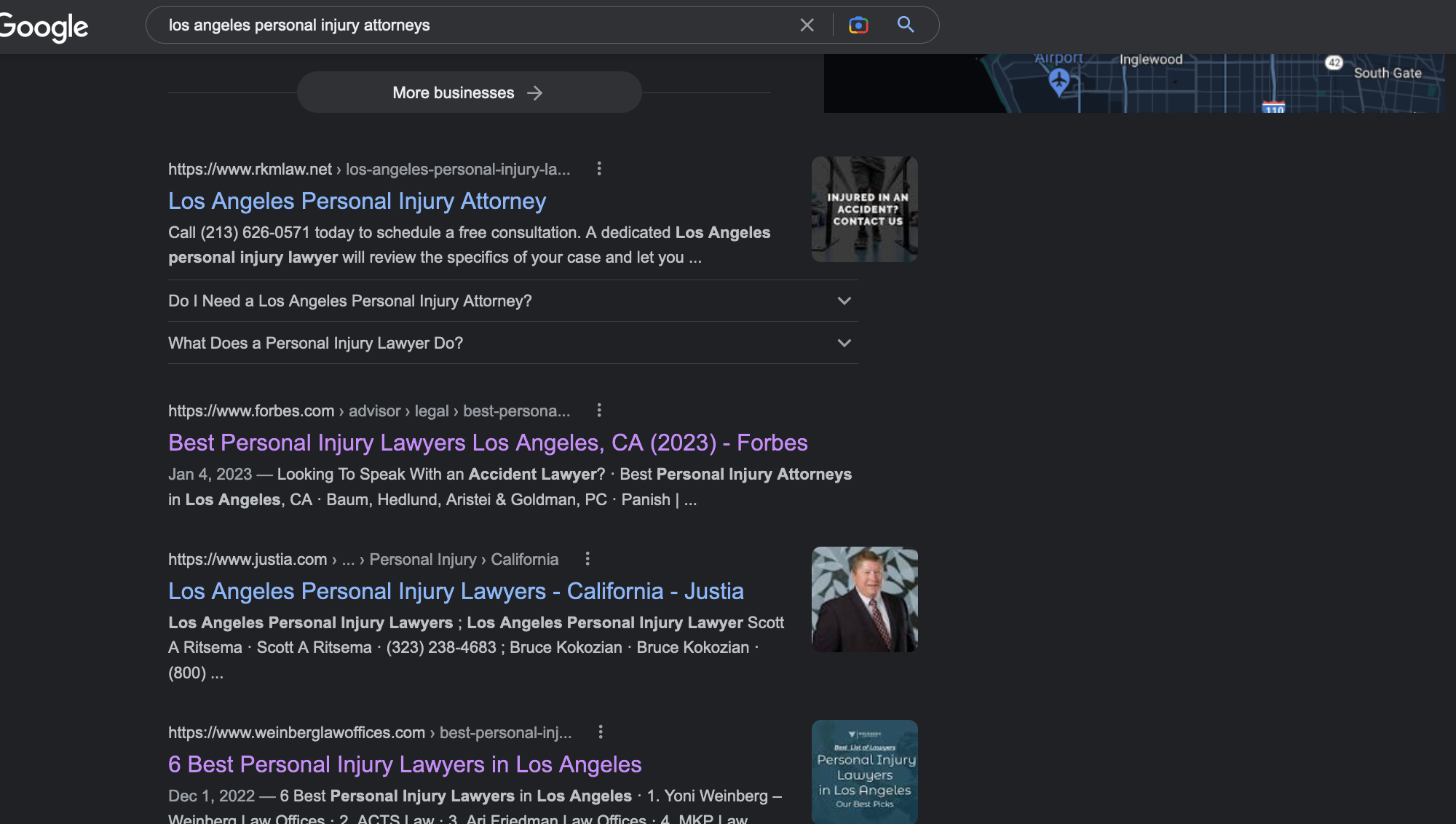
I personally never understood why a link from a generic news site like Forbes or People Magazine would be better than a link from a law-related publication. Journalists nowadays seem to be into opinion journalism anyways, so I don’t see their stories as very trustworthy. When only one side of the political spectrum thinks the “news” reporting is fair, we have a problem. And the fact check labels are largely inaccurate or misleading, in my opinion, and I am not a political person at all.
Generic News Site Links Are Good if From Media “Trusted” By Google?
For now, the law sites with links from big journalist sites are cleaning up in organic search. And when I look at these links and the articles many are posted in, I am flabbergasted as to why they are even there, as many look unuseful.
Lawyers that convinced their friends to vote for them were able to get into US News as “Best Lawyers,” but those user-generated profile links are now worthless for SEO since UGC tags were added at the behest of Google. So at least Google is trying to level some things out on a case-by-case basis. Nonetheless, generic news sites like Forbes started taking over for search terms like “Los Angeles personal injury attorneys” and, of course, started selling ad space to lawyers.
Disgraced personal injury attorney Tom Girardi tried to help the LA Times with a similar program, but Forbes seems to have taken that torch and ran with it. There is now also a whole cottage industry designed to sell you access to news journalists that can run into hundreds of thousands of dollars in payoffs. Journalism school might not be such a bad option after all! I personally don’t trust any media site, as their views are skewed in favor of those pushing a paid agenda from sponsors. For-profit media is NOT unbiased, and it’s DEFINITELY not neutral.
History Repeating in New Way?
Years ago, lawyers and prospective new clients complained about Yelp! and Findlaw and even that Wikipedia were knocking local attorneys out of SERPs, and Google apparently adjusted their algorithm. Googlers called it “Penguin Poo.” The fact is, most consumers hate paid sites and advertising directories. Besides, Google is already a lawyer directory. At least Google seems to understand this basic UI/UX fact.
The Unhappy News Keeps Getting Worse?
Many webmasters complain that Google seems to keep pushing organic results further down the page in favor of paid ads. Shareholders complain that Google has been suffering major losses in court over complaints about electioneering, and partisan political gamesmanship, all lowering stock values.
Users complain about political filters being applied to reduce access to data and claim they have been turning to less politically biased sites like DuckDuckGo. Again, this means less value to Google and its shareholders. The right says it’s unfair, and right-wing U.S. states and consumers will keep suing Google until all sides feel Google is fair.
Nonetheless, serving up neutral data was once Google’s bread and butter, and we have to assume Larry Page did not want only one side of the story presented. Even the search quality guidelines say you should present both sides. So let’s look at their recent tweaks some more with an open mind.
The December 2022 Link Spam Update Took No Prisoners
Before the latest update, the last check was in July 2021. Since then, the goalposts have moved to further nullify unnatural links and ensure a website’s ranking is deserved.
Many sites that previously generated a pass result have now been hit with a fail from the updated automated systems.
Does the Criteria Change?
Google rolls out new guidelines and expectations regularly to avoid people finding ways to cheat the systems- and those who had attempted to since July 2021 got hammered in the latest roundup.
Surprised by the Results?
At the surface level, many of these websites look legitimate and show no signs of spammy content, but Google’s AI-driven searches look deeper for hidden red flags. It is reassuring to know that these checks dive deep to protect users and call out what Google says are low-quality sites. The updates also highlight those websites that earn their high rankings according to what their algo honestly thinks is fair.
What Does Google’s Spam Update Search For?
The search engine giant has not shared exact details of what it looks for, but it is essentially a spam detection system to ensure search traffic is not directed to sites that do not meet Google’s definition of quality content.
In general, spam update looks for thin content- which presents itself in many ways. Too many sites have a shockingly low amount of valuable product content or information and instead focus on tools used to trick the search results into recommending them.
Core Considerations
There are many things covered in the Google link spam update- but here are a few of the most common discrepancies.
Unnatural Links
Bad links are a huge problem online today. People trust the outgoing links they find on sites that Google recommends- so it is essential to eliminate websites with links that are questionable. Sites buying links from ranking sites are heavily penalized by the search engine. It is directly against Google’s spam policies to acquire links from paid sites in an attempt to become more visible.
Passing outgoing links are ones that add value and relate to the website. As an example, a link to a cookware shop makes sense on a recipe site- but not on a mechanics site. In my mind, a link from a lawyer site to a lawyer site makes more sense than a link from Forbes or even Findlaw, for that matter. But right now, it’s all about finding a journalist and hitting that gold dust.
However, we do know links are scanned to detect spam directly based on the URL and link credit. And as discussed, Google likely knows you paid that journalist if you are using the same computer you search Google with to communicate with your link network.
Keyword Stuffing
Keyword rankings play a significant role in modern site-building. Every online company aims to optimize its keywords to attract the right people to their site- but some take it too far and work in popular key searches that have nothing to do with their product.
AI-generated content is often pinged for keyword stuffing- and is frowned upon even if it doesn’t. A company should fill its site with genuinely useful information and products its clients want- not just buzzwords thrown in by automated programs.
Poorly-created Meta Tags
Poorly-created meta tags or duplicate meta tags also raise an alert in Google’s spam update. Many websites that we saw that got hit in the update were guilty of having tags designed for the benefit of search engines- not humans. Bad meta tags can muddy search results- and ultimately negatively impact the user’s experience, according to Google.
What Lawyers Got Hammered in the Latest Google Spam Update?
Following the latest spam update, Google announced the websites that failed to impress- and some of the results were surprising. Included in the list were several legal websites linked to law firms in the US. Here is the inside scoop on who got called out and why.
Barnes Firm Takeaway – An Alltime Loss of $5, 909, 741.00 in Search Traffic Value Down to $1, 094, 312.00
The California-based law team at Barnes Firm in Los Angeles could use some accident assistance themselves after being exposed for sharing low-quality content- according to Google’s 2022 spam update. Specific details of what was flagged on the well-known accident and injury plaintiff firm’s websites are unclear- but it did not pass Google’s new algorithm update for spam detection.
Barnes Firm claims to take pride in serving their community and clients and striving for the best possible results- but the same clearly does not apply to the quality of their online page in Google’s eyes. The site’s ranking took a hit since being called out by the world’s leading search engine for serving spam to the client.
Starting around December 14, 2022, the same time as Google announced they were running their linkspam update, Barnes started falling from its high of $5,909,741.00 in February 2022 to a daily dropping traffic value as of today of $1, 094, 312.00. As you can see in the screenshot, after December 14, 2022, Barnes lost enormous traffic value.
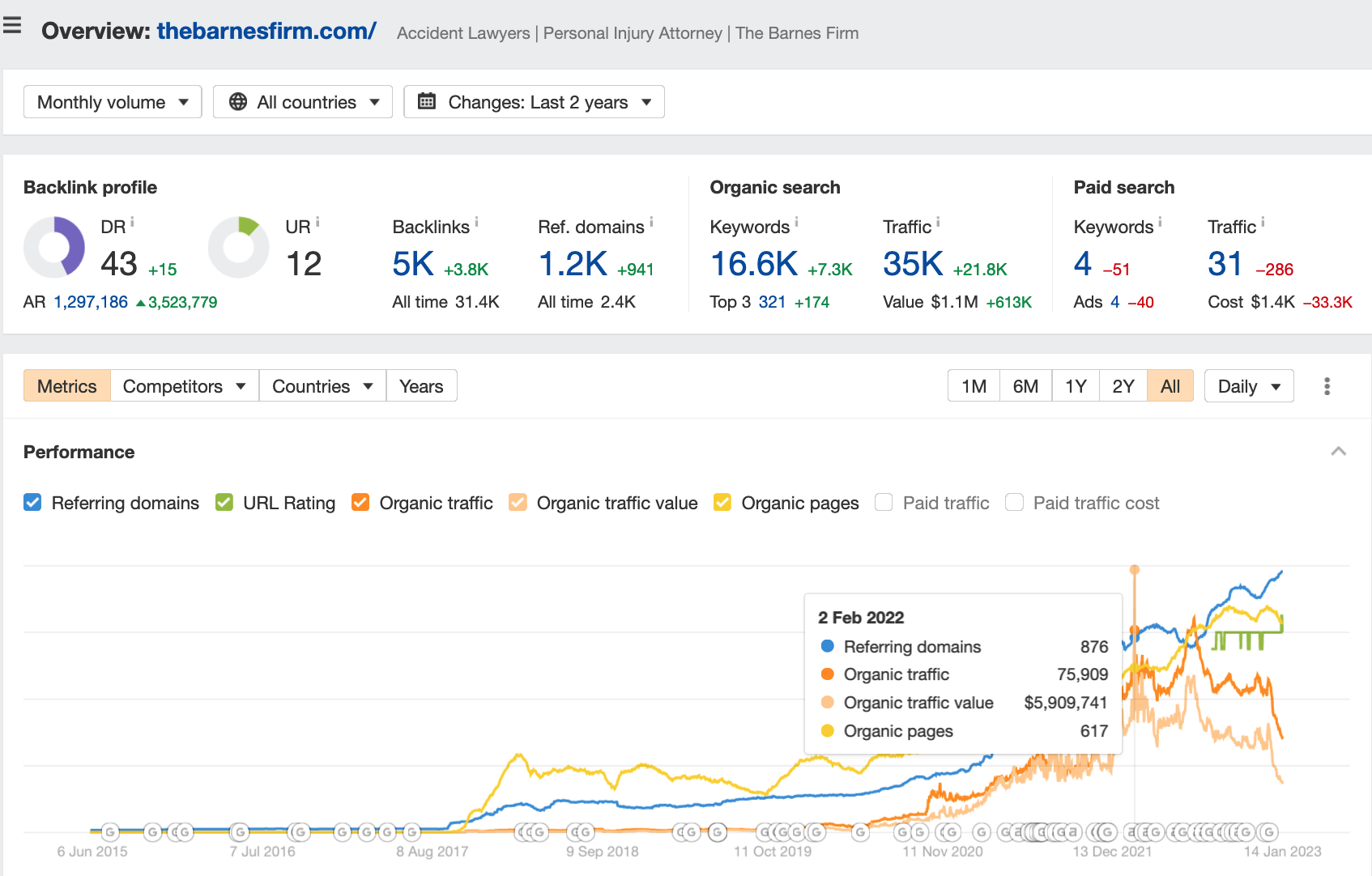
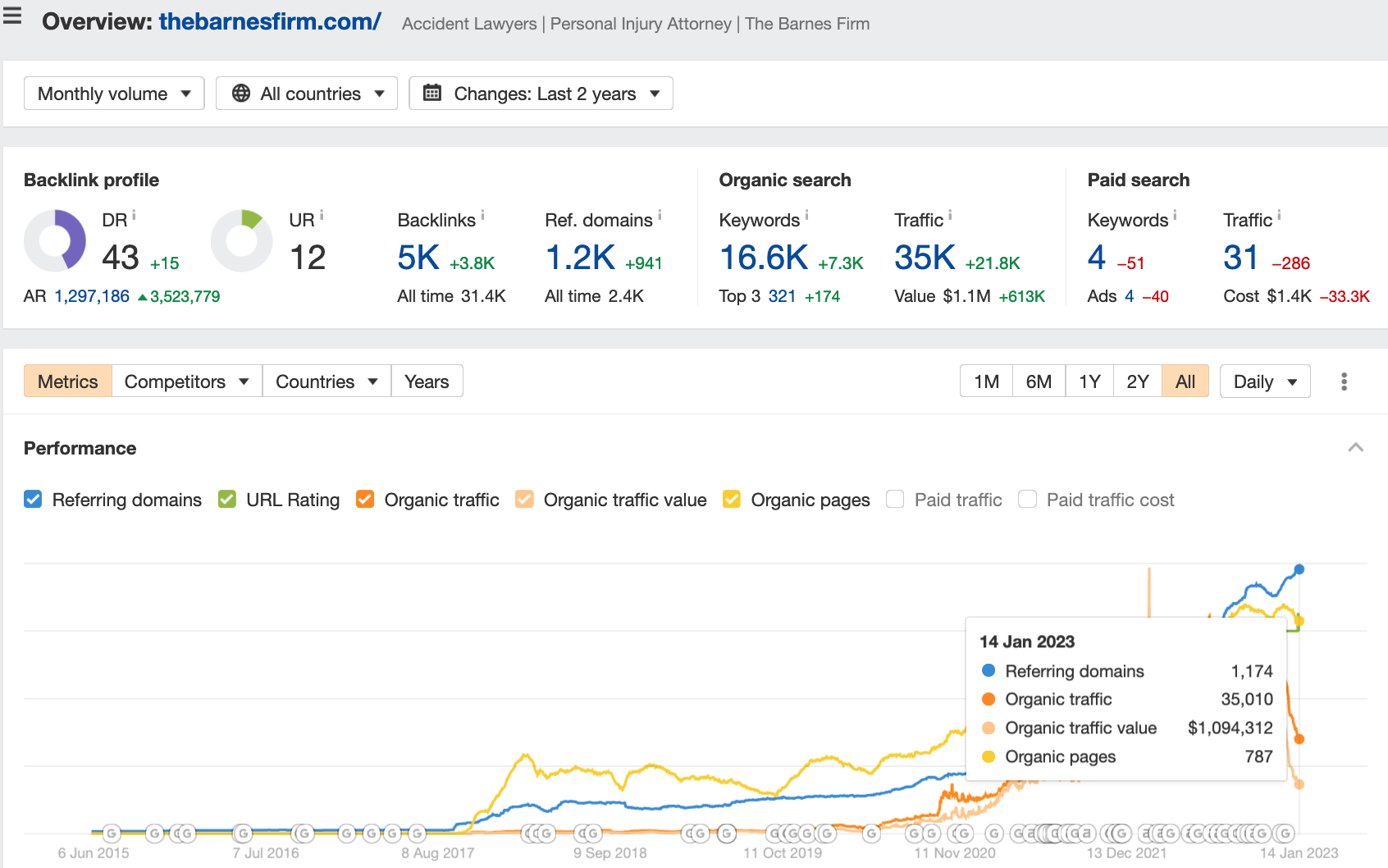
A Fall From Grace
They may be flying high in the legal world, but Barnes Firm has stumbled where its trustworthy online reputation is concerned. They fell from
Morgan and Morgan – Big Winner
Florida-based Morgan and Morgan is one of the most prolific injury law firms in the US and is considered a trusted source by many referral attorneys who want leads and cases and who can’t afford ad spend or do SEO. They have been setting up Google Maps listings all over the US, apparently with what appears to be their Los Angeles PMB receiving over 350 reviews, with at least half extremely negative, in a world record amount of time for any out-of-state law firm. Not bad for an out-of-state lead gen op freshly marketing in California. It appears they maintain hundreds of Google My Business listings in Florida and seem to be doing the same thing in Los Angeles. Like Florida, their negative reviews are off the charts. But also, like Florida, it seems the Downtown Los Angeles PMB has a solid system in place to bury them.
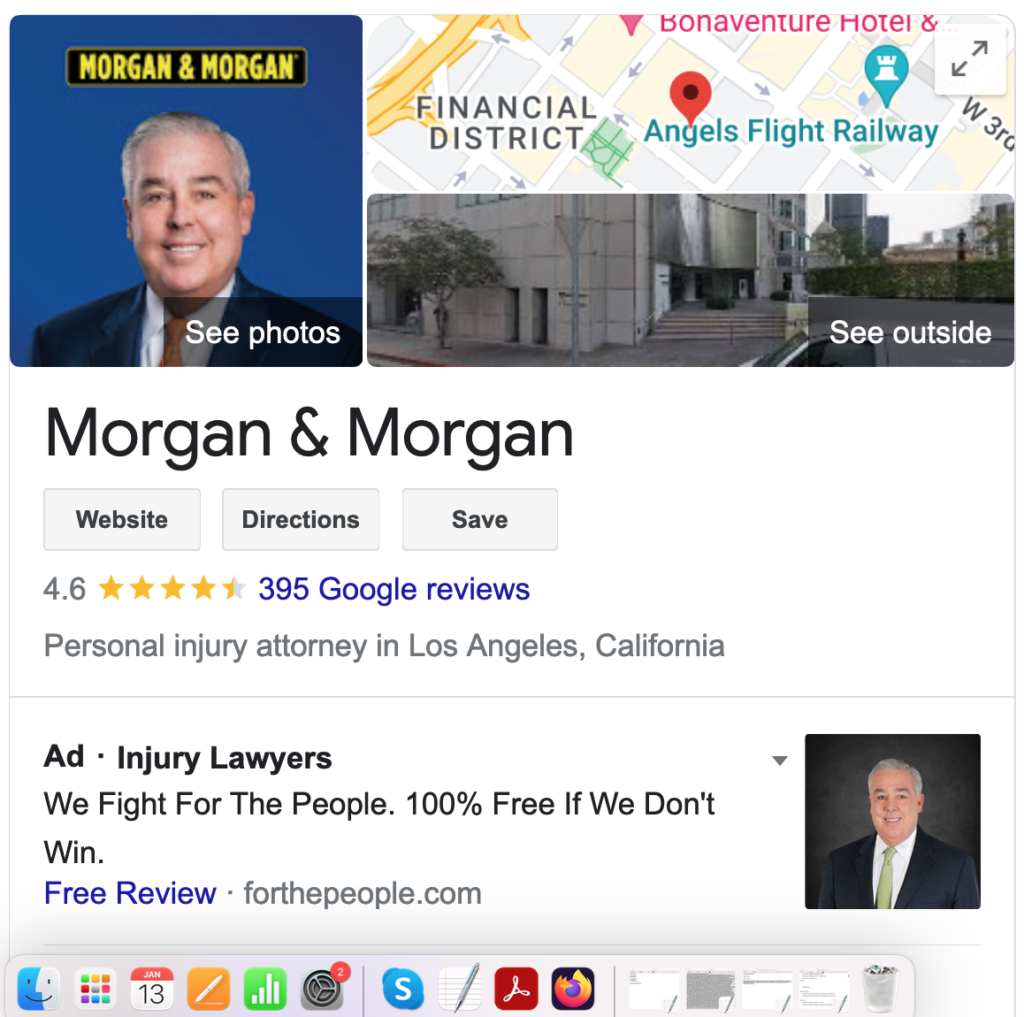
New Los Angeles PMB? ^^
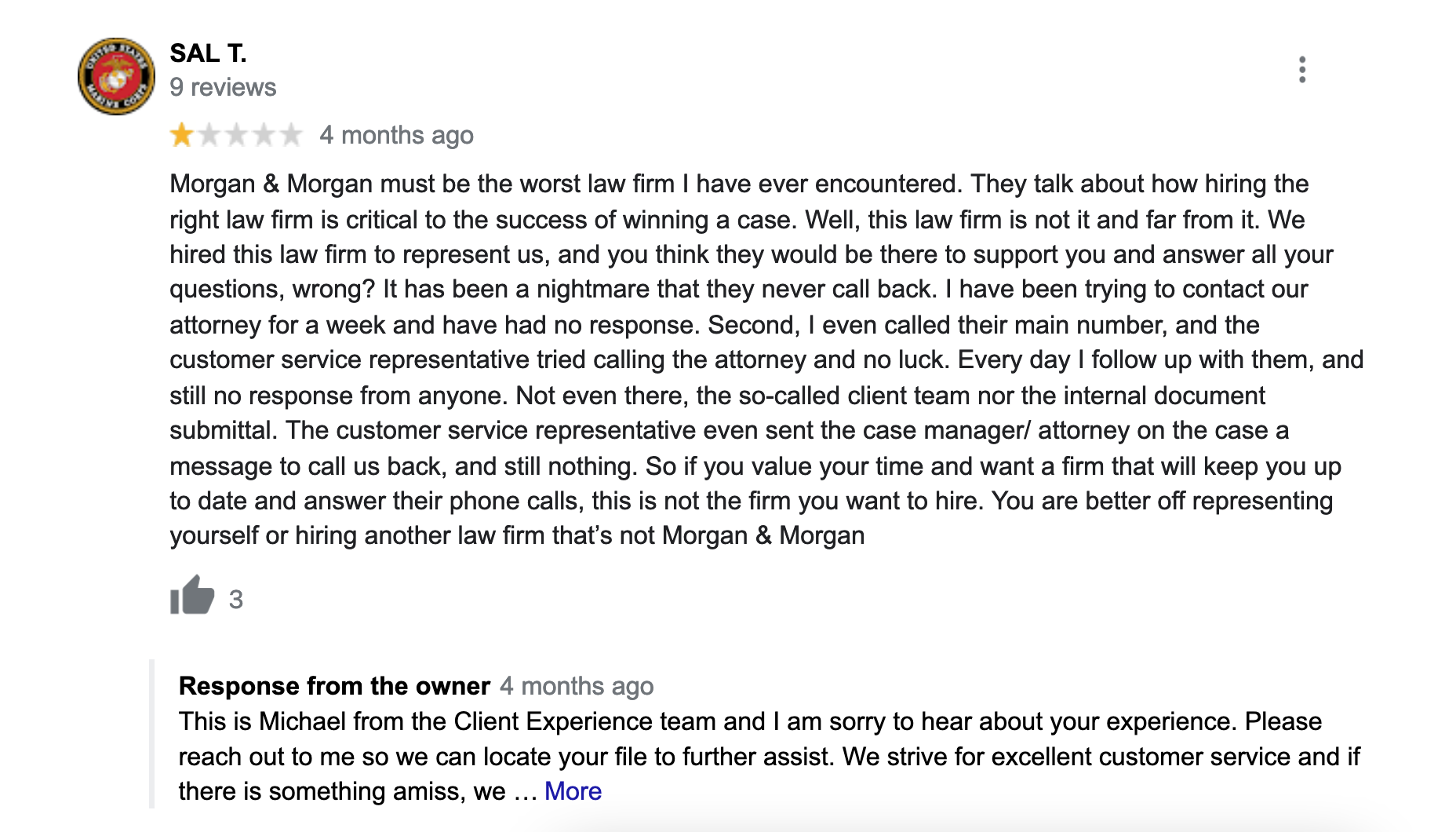
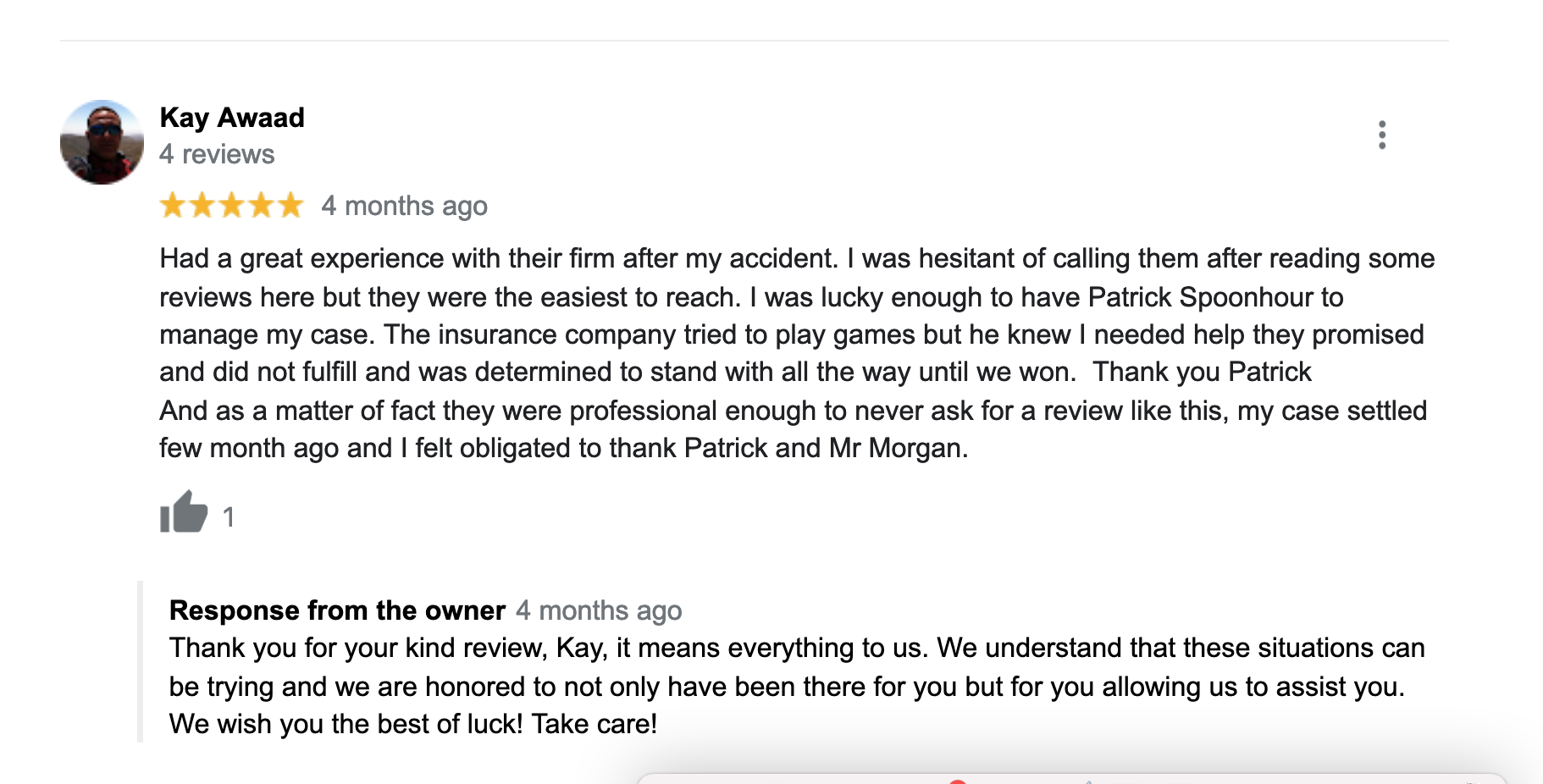
Review of Los Angeles Virtual Suite from Florida User? 🙂
Amazing, this Florida-based law firm achieved all these amazing positive reviews in what seems like a few months. As automated systems learn, it is likely a matter of time before the out-of-state positive reviews from an out-of-state user profile might not be able to bury the negative reviews in other states where a marketing company may seek to set up a PMB or virtual location.
Florida User Kay Awad?
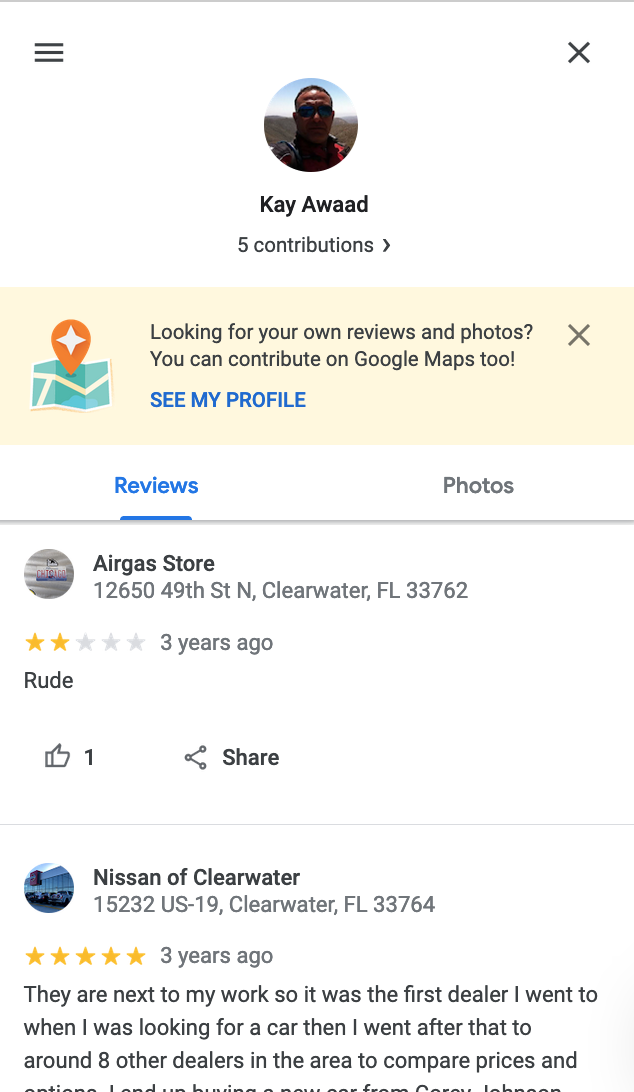
Although the firm was not flagged in the latest Google spam update for poor-quality content, etc., I found many examples of poor, thin content and off-site link spamming. Their saving grace seems to be their ability to get tons of backlinks from journalists on powerful News sites that Google loves and from law firms to which they refer cases to.
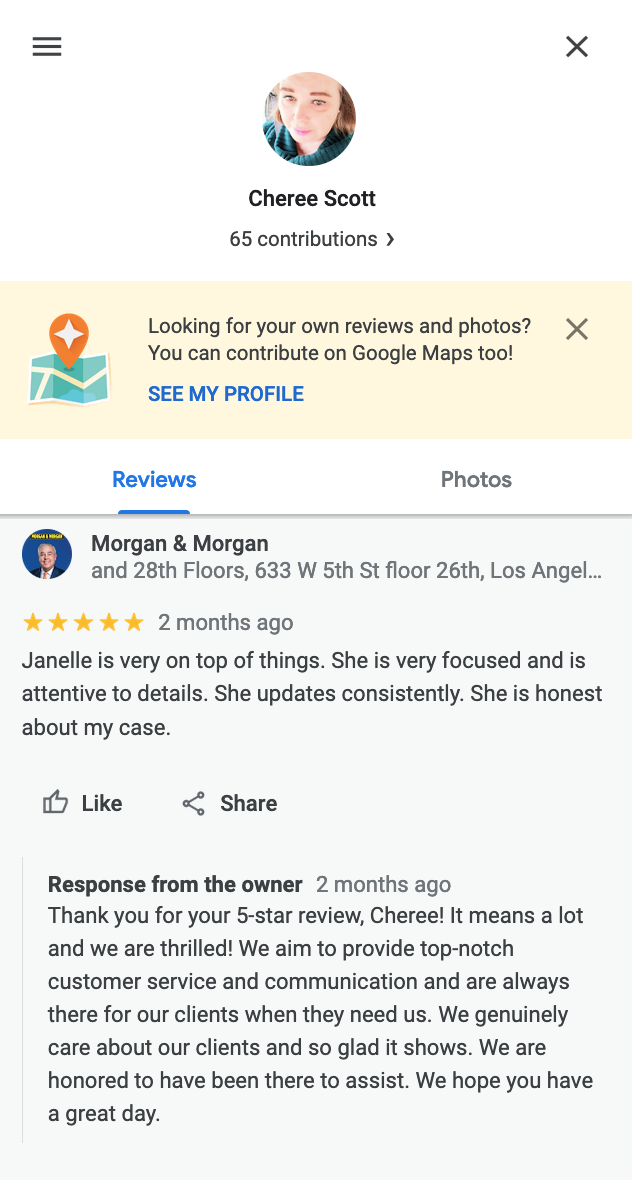
Google Mapsguide: Cheree Scott From Florida Reviewed Champion Law Firm in Encino, CA, Morgan, and Morgan In Los Angeles, New York, and Florida? She must get hurt a lot and travel often!
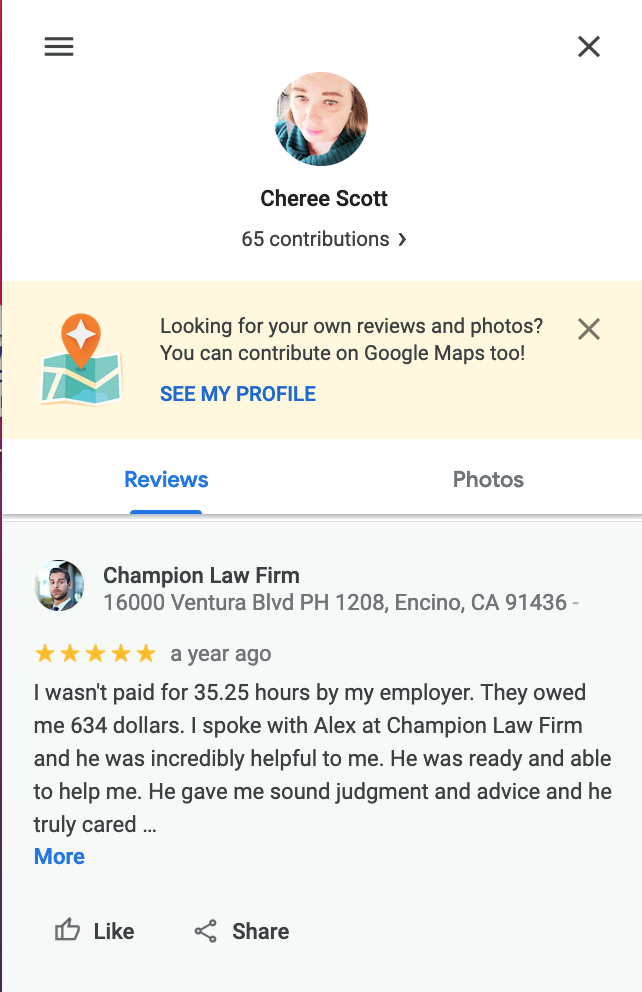
Marketing itself as a law firm for the people, Florida-based Morgan and Morgan apparently is more of a nationwide lawyer referral service that gets leads in other states and sends them out to local law firms and lawyers in those states for a referral fee.
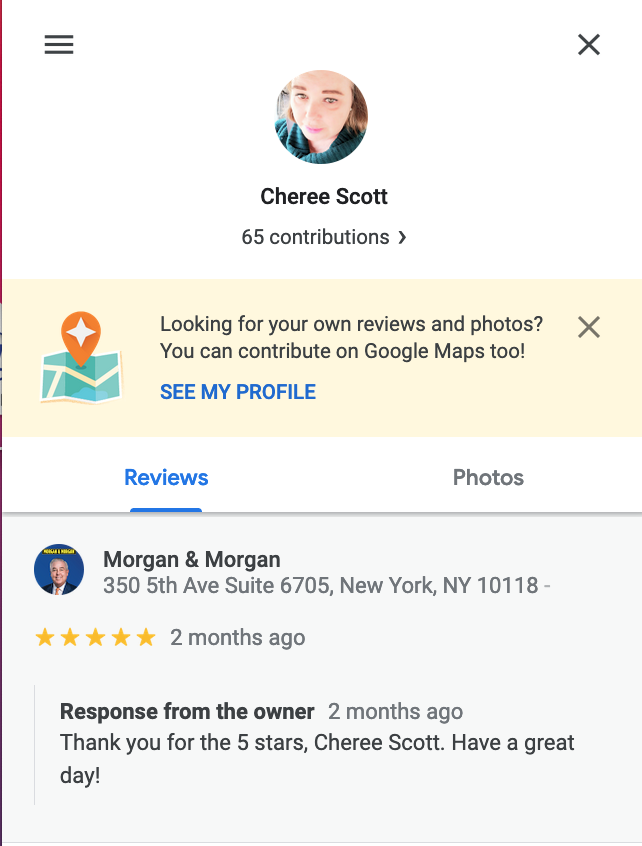
The negative reviews on Google in California immediately get buried by several positive reviews from user accounts in Florida, GA, or another state. The same MapsGuides also seem to review other lawyers and Morgan’s “locations.”
So it appears this marketing venture is composed of pros and perhaps the best online lawyer marketing/lead gen company I have ever seen, or I will eat your shoe. lol!
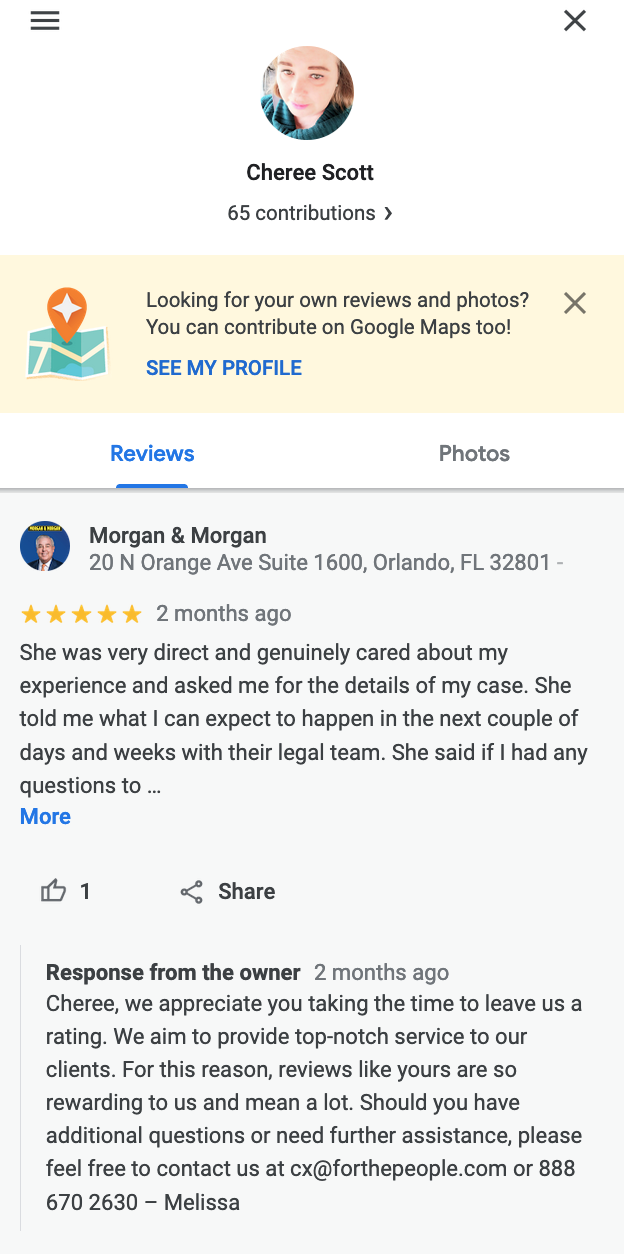
It appears much of the Morgan and Morgan search traffic comes from hundreds of Google Maps listings at Regus-type locations, so it may be a bad idea to follow this particular model. If I was able to find all this what appears to be map spam in seconds, imagine what Google could do. At least, it appears Morgan and Morgan are whitelisted in this, as I have never seen anything on this scale before. My research shows that none of these buildings are staffed 24 hours a day. After looking at everything, I just don’t trust what I am seeing here.
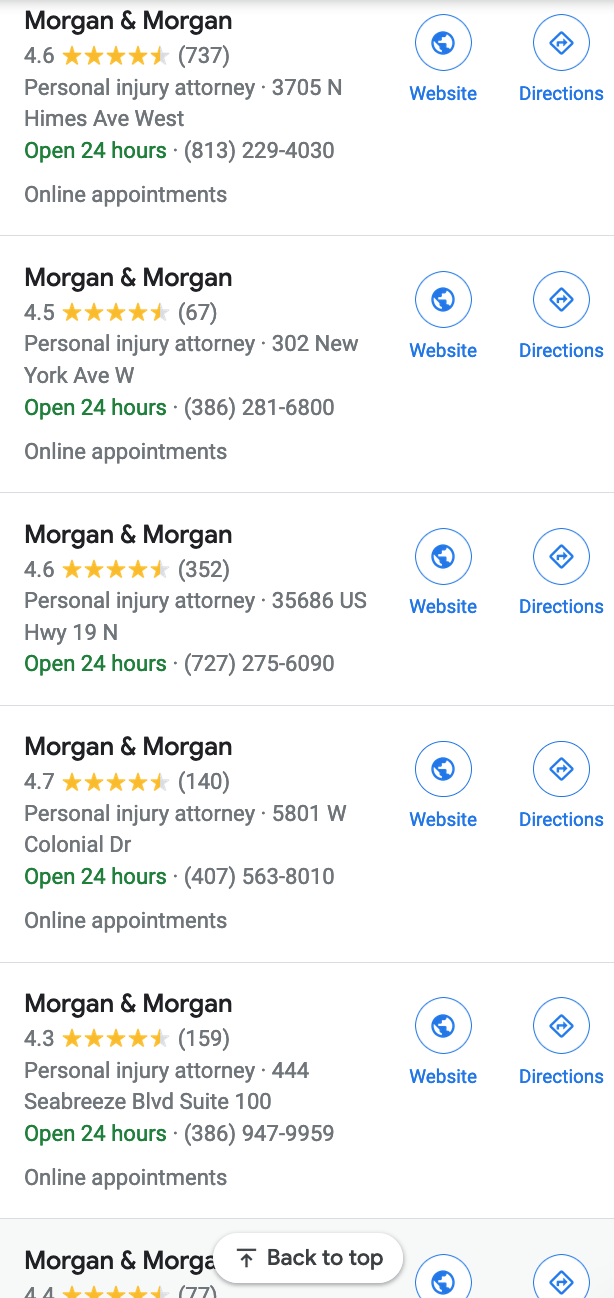
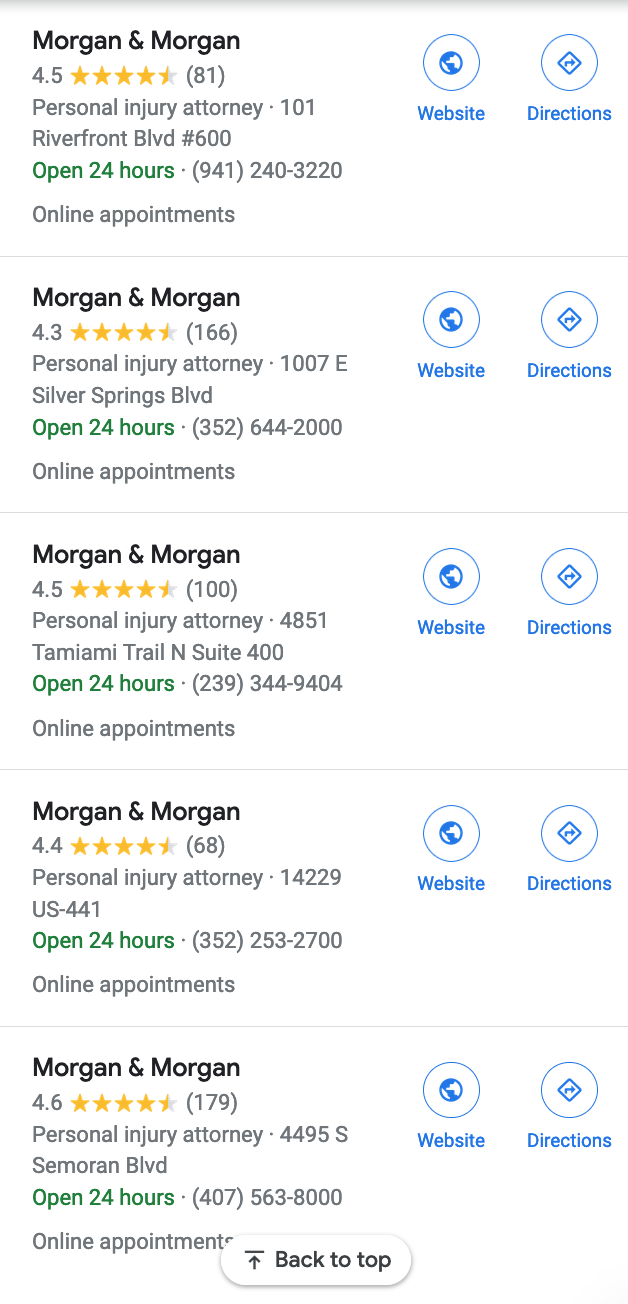
By attempting to increase traffic and boost rankings, Morgan and Morgan is an example of a big winner, generating over $16 million a month in organic search traffic, up from $10,335,570 to $16,448567 at the end of the linkspam update and STILL rising daily! The site’s ranking for big dollar keywords is second to none, despite many examples of keyword stuffing and poor copy riddled across their site.
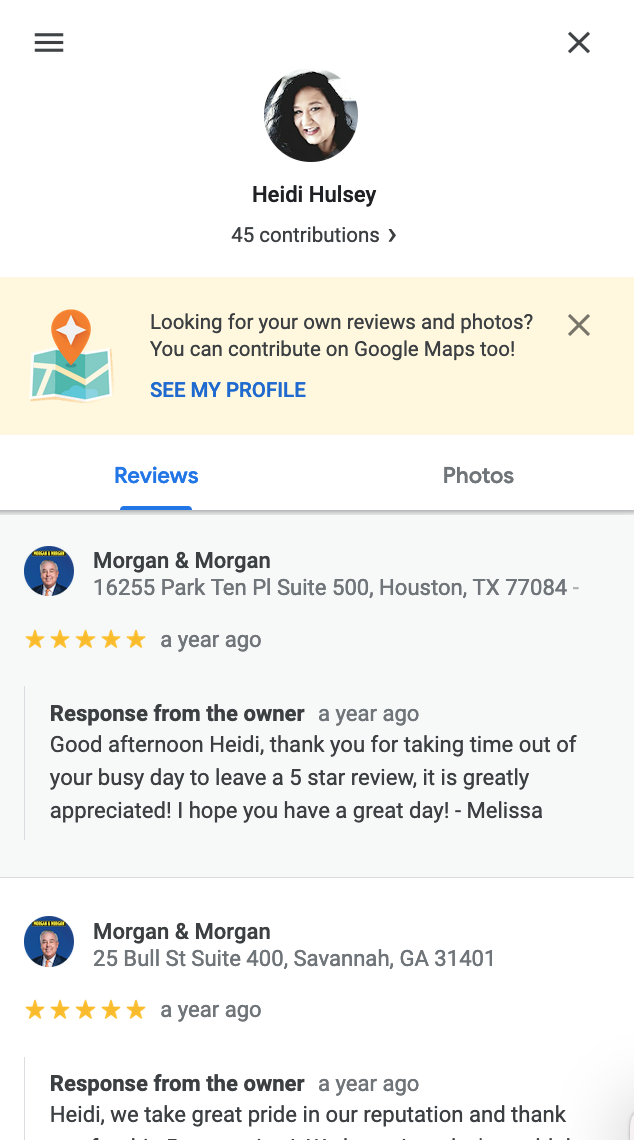
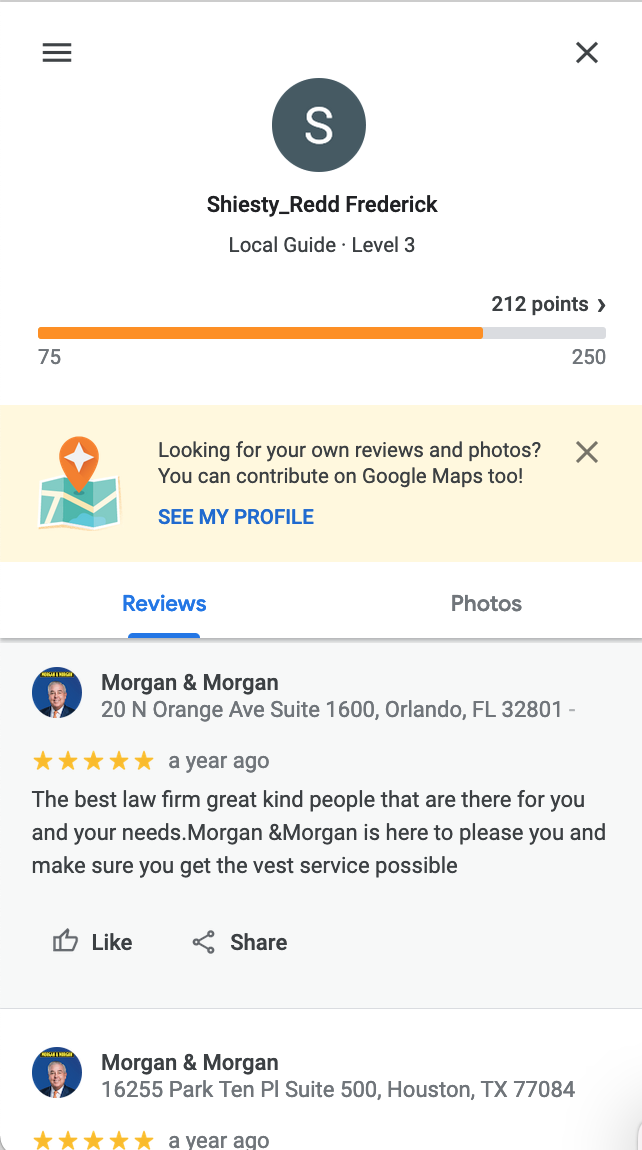
The takeaway is that making changes may not always be necessary to help a site improve if you have lots of links from big news sites and get reviewers to review what appear to be hundreds of virtual locations across the country. Other websites without this type of link profile and a more common sense word count for their articles may never survive Google spam updates. So your site’s security means getting links from BIG MEDIA and making friends with journalists. Don’t think you will get away with setting up tons of hot desks and virtual locations and get away with it like the big boys with friends in Silicon Valley.
One idea is to brand yourself as an activist lawyer, as Morgan and Morgan apparently have done. This tactic seems to be the easiest way to get links from Big Media. Based on my 30-plus years of technical research and the ideology of GooglePlex, this is the best way to ensure your web presence is adequately secured. This single act alone can potentially help you survive the most deadly search spam update in all languages across the globe, as evidenced above. These are necessary changes if you want to fit in or recover your rankings in your niche, especially if you are an injury attorney, in my opinion.
A Question of Integrity in technology
Poor content may not necessarily mean poor legal service, but it does throw into question the integrity of those responsible for the website. As an attorney, integrity is something that should never be in doubt with clients or with Google. If you violate trust, Google could blacklist or shadow-ban your results and make you see a cataclysmic drop.
Create A Spam-Free Legal Firm Your Clients Can Trust
Clients want to believe in helpful content, and it’s no secret that you need to dedicate your time, effort, and resources to providing your customers with the best online guidance and assistance. This is why it’s imperative to align with Google’s strict definition of what high-quality content should be. Steer clear of spammy links and other unnecessary content used by some other sites and firms to trick users- Google will punish your site for this.
Instead, share valuable legal insight and reliable information that puts your clients above search rankings- proving that your professionalism and dedication to the law and the people who need your help are beyond reproach. Create a place where you can easily show that your firm is trustworthy, passionate, and highly experienced in law.
How to Ensure Your Website’s Rankings Appear Majorly High
If you want to ensure your clients can trust your firm and show that you have their best interests at heart, you have to do this from the first moment they view your website. No false promises and no worries — your clients have enough to worry about.
Remember — Don’t Do Spam – Eventually, Google Will Have to Blacklist You
Shareholders who also have online businesses will use data like this to show Google is biased in favor of spammers who support their political leanings. So ultimately, Google will have to stop spammers it likes too. My advice? Create a place where spam is not in your company culture, and don’t waste your client’s time. Everything you do on your site should be for the benefit of your clients, not a kid who works at Googleplex you might be paying off, etc.
From the way you practice law to the content you share online, BE HONEST. Get into social media and never discuss politics or COVID-19, as you could be shadowbanned if you disagree with the corporations running these platforms or the politicians on their teams. Show your clients that if they work with you, they are guaranteed the best support from the best people- beginning to end.
Resources:
